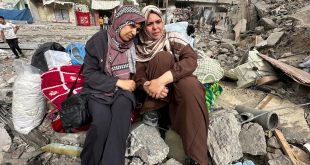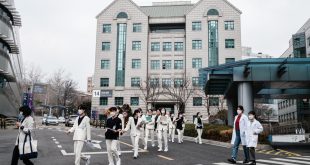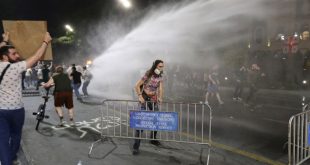Some 100,000 refugees have arrived in Armenia since the end of September and many have received support from the UN’s International Organization for Migration (IOM).
Here are some of their stories.

© IOM/Joe Lowry
Ophelia Aghajanyan
Ophelia Aghajanyan: We are pensioners. My husband, who used to be a soldier, is a disabled man. My son as well. My sister’s only child was brought here in a closed coffin.
We buried a lot of our relatives. I have left my holy dead, and I don’t blame myself; I have brought a handful of soil with me. What are we going to do? I don’t know. Who cares about pensioners?

IOM/Joe Lowry
Andranik Harutyunyan
Andranik Harutyunyan: The same day as they started striking our village, our whole community moved into to a cave. When it was time for all of us to leave the village, no one took anything from Berdadzor. Some people were able to get their family out by car, at least. But some were not.
If anyone can help anyone in our community with a place to live, the rest will be taken care of by us. We all are working families. We all will work to provide for our families.

© IOM/Joe Lowry
Svetlana Lazaryan
Svetlana Lazaryan: (previously living in Armenia) When I decided to return back to Karabakh, the woman who I was living with asked me a question: ‘Where are you going? You have no residence, no possessions. I said, ‘I don’t know where, but I’m needed there.’
I don’t know… The call of the heart… The call of blood. My parents are buried there. I have left my brother’s grave. I have left my father’s grave.
We understand our own pain. We must support each other and not wait for some external assistance. Why does no one want to hear and see us, understand our pain?

© IOM/Joe Lowry
Edgar Yedigaryan
Edgar Yedigaryan: I am engaged, and my fiancée is currently displaced in Hadrut region. We had decided to get married, but unfortunately this tragedy happened. But again, we are not breaking apart, we are not falling into despair. We will be able to overcome this and stand up again.
In terms of finding a job, if there’s no vacancy in state institutions, we will definitely do agriculture, farming, and take care of our family. We are working folk; we all can create something.

© IOM/Davit Gyumishyan
Marianna Grigoryan
Marianna Grigoryan: My mum and grandma fled in the 1990s and we don’t have a house. I am unaware of the concept of owning a house. And to be honest, I don’t even want to know what that is. Because I have seen how people build up those walls, put bricks on each other, make a home to live in and then be obliged to destroy what they have worked on for 30, 20, 15 years, in one second.
On the 19th, when that massive war situation started, people flowed to Stepanakert. Under bombardment and shooting, we started running from basement to basement. We figured out the amount of people per place and started quickly collecting blankets, shoes, everything we had. What’s happening here (aid distributions), we were doing the same things under bombing.
 Top Naija News: Nigerian News, Breaking News Nigeria and World News Top Naija News is a daily news publication in Nigeria, delivering the latest breaking news in Nigeria and around the world.
Top Naija News: Nigerian News, Breaking News Nigeria and World News Top Naija News is a daily news publication in Nigeria, delivering the latest breaking news in Nigeria and around the world.



